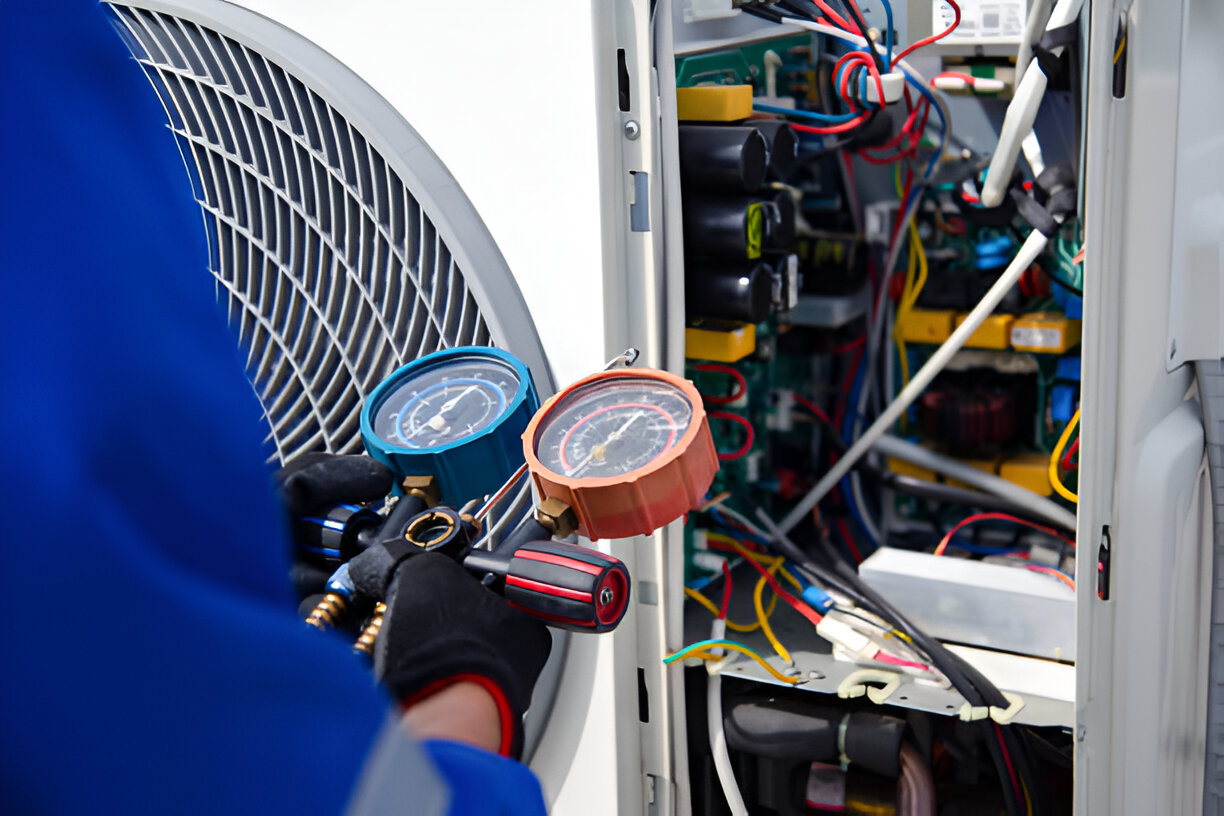
AC Tune-Up in West Chester, PA
Keeping your air conditioner running reliably through West Chester summers starts with a proper seasonal AC tune-up. In a region with hot, humid summers and frequent spring pollen, a tune-up is not just preventive maintenance — it directly improves comfort, reduces breakdown risk, and helps your system run more efficiently when you need it most.
Why an AC tune-up matters for West Chester homes
West Chester experiences warm, humid summers that make HVAC systems work harder. High humidity promotes coil buildup and reduces cooling capacity. Spring pollen and fall leaf debris can clog filters and outdoor coil fins. Many local homes are older and may have duct leaks, reducing airflow and forcing compressors to run longer. A seasonal AC tune-up addresses these local stresses so your system can deliver steady, efficient cooling without surprise failures.
Common AC problems in West Chester
- Poor cooling or long run cycles - often caused by low refrigerant, dirty coils, or restricted airflow
- High energy bills during peak months - usually from reduced efficiency due to buildup or worn components
- Short cycling or frequent tripping - signs of electrical or compressor stress
- Weak airflow - caused by dirty blower motors, clogged filters, or leaky ducts
- Water leaks or clogged condensate drains - common with high humidity and blocked drain lines
Standard AC tune-up checklist
A professional seasonal AC tune-up follows a thorough, items-based checklist to restore efficiency and reliability:
- Clean outdoor condenser coil and straighten bent fins to improve heat transfer
- Inspect and clean evaporator coil (if accessible) to maintain capacity
- Check refrigerant levels and test for leaks; recharge if needed and recommend repairs for leaks
- Tighten electrical connections and inspect wiring for wear or overheating
- Test capacitors, contactors, and relays for proper function
- Lubricate moving parts such as fan and motor bearings where applicable
- Inspect and clean the condensate drain and trap to prevent water damage and mold
- Check blower motor operation and measure airflow to detect restrictions
- Replace or inspect air filters; recommend appropriate filter type for your home
- Calibrate thermostat and verify system controls for accurate cycling
- Measure system pressures and temperatures to assess overall performance
- Document findings and recommend repairs or efficiency upgrades if needed
What to expect during a tune-up: timeline and process
- Typical duration: 60 to 90 minutes for a standard residential tune-up. Systems with difficult access, extra diagnostics, or repairs can take longer.
- Arrival: Technician inspects visible components and asks about performance concerns you’ve noticed.
- Safety and diagnostics: Technicians power down the unit for safe inspection, run electrical and refrigerant checks, and start performance testing.
- Cleaning and adjustments: Outdoor coil cleaning, condensate clearing, filter check/replacement, and tightening/ lubrication are performed.
- Final testing: System is run through a full cycle while temperatures, pressures, and airflow are recorded to confirm improved operation.
- Report: You receive a clear summary of work performed, any issues found, and recommendations for repairs or upgrades.
Benefits of seasonal tune-ups
- Increased reliability: Identify worn parts before they fail so you avoid emergency repairs on the hottest days.
- Lower energy costs: A clean, properly charged system uses less electricity to reach the same comfort level.
- Longer equipment life: Routine maintenance reduces wear on compressors and motors, extending the system’s lifespan.
- Better indoor comfort: Proper airflow, calibrated thermostats, and clean coils maintain steady temperatures and humidity control.
- Safer operation: Tightened electrical connections and component checks reduce risk of electrical failures.
- Preserved warranties: Many manufacturers require regular maintenance to keep warranty coverage valid.
- Improved indoor air quality: Clean filters and coils reduce dust, pollen, and microbial growth circulation in high-pollen seasons.
Recommended frequency and seasonal timing
- Annual tune-up: Schedule at least once per year in spring before cooling season to prepare for West Chester’s warm months.
- Twice-yearly service: Consider two visits per year — one for cooling in spring and one for heating in fall — if you have high usage, an older system, or want maximum reliability.
- After storms or extended downtime: If the system suffered a power outage or visible debris accumulation, get a post-event inspection.
How tune-ups integrate with maintenance plans
AC tune-ups are the backbone of any HVAC maintenance plan. A maintenance plan typically includes:
- Scheduled visits and reminders timed for optimal seasonal preparation
- A consistent checklist so each visit builds on previous work and tracks system history
- Priority scheduling and documented service records to speed diagnostics when problems arise
- Routine filter replacements and preventative parts inspections to reduce emergency calls
- Bundled heating and cooling visits for homes that want year-round protection
For West Chester homeowners, joining a maintenance plan ensures tune-ups happen before peak humidity and pollen seasons, keeping systems efficient and reducing mid-summer failures.
Practical tips for West Chester homeowners between tune-ups
- Replace or clean filters every 1 to 3 months during heavy use, especially during pollen season
- Keep the outdoor unit free of leaves, grass clippings, and debris; maintain at least 2 feet of clearance
- Close attic vents and insulate to reduce heat load in upper floors
- Use zoned thermostats or programmable settings to reduce unnecessary runtime
- Check for unusual noises or odors and schedule an inspection promptly rather than waiting


Enjoy flexible financing options that make upgrading or repairing your HVAC system easy and budget-friendly.










